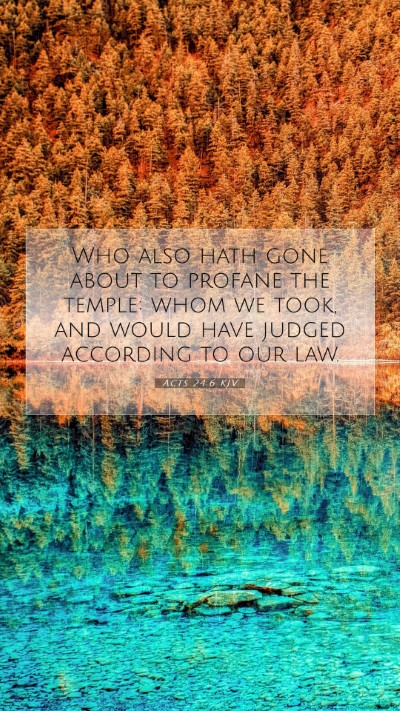Old Testament
Genesis Exodus Leviticus Numbers Deuteronomy Joshua Judges Ruth 1 Samuel 2 Samuel 1 Kings 2 Kings 1 Chronicles 2 Chronicles Ezra Nehemiah Esther Job Psalms Proverbs Ecclesiastes Song of Solomon Isaiah Jeremiah Lamentations Ezekiel Daniel Hosea Joel Amos Obadiah Jonah Micah Nahum Habakkuk Zephaniah Haggai Zechariah MalachiActs 24:6 Meaning
What is the meaning of Acts 24:6?
Who also hath gone about to profane the temple: whom we took, and would have judged according to our law.
Acts 24:6 Bible Verse Meaning
Bible Verse Meaning: Acts 24:6
Verse: Acts 24:6 - "Who also hath gone about to profane the temple: whom we took, and would have judged according to our law." (KJV)
Understanding the Context
The verse is part of a trial narrative where the Apostle Paul is defending himself against accusations made by the Jewish leaders. In Acts 24, he appears before Felix, the Roman governor, and his confrontation reflects tensions between early Christians and the Jewish authorities.
Bible Verse Commentary
This passage is crucial for understanding early Christian history and the legal challenges faced by the apostles as they spread the message of Jesus Christ. Here are some insights derived from various public domain commentaries:
-
Matthew Henry:
Henry emphasizes the injustices Paul faced and the nature of the accusations against him. This verse illustrates the false charges laid out by his opponents who claimed he desecrated the temple, a serious accusation among the Jews. Paul was wrongly accused, and Henry outlines the importance of defending one's faith amidst such trials.
-
Albert Barnes:
Barnes highlights the significance of the temple in Jewish culture and the gravity of any act perceived as defiling it. His commentary suggests that Paul’s opponents were leveraging cultural and religious sentiments to incite hostility against him, knowing the temple was central to Jewish identity. The accusation reflects the broader conflict between Judaism and the emerging Christian faith.
-
Adam Clarke:
Clarke provides an analysis of the accusations as part of a broader political scheme, suggesting that the Jewish leaders felt threatened by Paul’s influence in the community. He discusses the implications of this verse for understanding the resistance faced by early Christians and the legal complexities of their time, situating Paul’s defense as a pivotal moment in the spread of Christianity.
Significance of Acts 24:6
The verse not only illustrates a historical moment but also encapsulates themes of justice, faith, and the clash of cultures. It becomes evident that early Christians were not only spreading a religious ideology but were often drawn into the political and social conflicts of their day.
Practical Applications
Understanding Acts 24:6 can deepen one’s Bible study insights and provide valuable lessons for Bible study groups or online Bible study settings. Here are a few points for reflection and application:
- Identifying Injustice: How do we respond to situations that reflect injustice in our communities today?
- Defending One’s Faith: What can we learn from Paul's example of standing firm amidst accusations?
- Cultural Sensitivity: How do we address conflicts stemming from cultural differences in our spiritual lives?
Cross References
Acts 24:6 is related to several other scriptures for deeper understanding:
- Acts 21:28 - Discusses accusations against Paul regarding the temple.
- Acts 22:30 - Paul’s Roman citizenship is considered in the context of his trial.
- John 2:19-21 - Jesus refers to the destruction of the temple, which is significant in understanding the context.
Conclusion
The examination of Acts 24:6 reveals layers of conflict and the complexities faced by early Christians. Through a combination of Biblical exegesis, scripture analysis, and Bible verse interpretations, we see how this verse is emblematic of broader themes in the New Testament. By analyzing the accusations against Paul, we learn about the challenges of standing firm in one’s faith, the importance of cultural awareness, and the necessity of justice in our communities.


